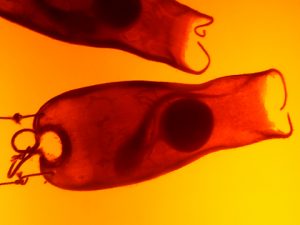Despite its distance from the ocean, the University of Chicago has a surprisingly large community of affiliated researchers who study marine ecosystems and the organisms they contain, both in modern and historical times. Research themes range widely and include the interplay of atmosphere and ocean on elemental cycles and climatic changes, diversity and function of marine microbes, patterns of extinction and speciation in the fossil record, the biomechanics of marine organisms, the distribution of marine organisms and their evolutionary relationships, and the ecology and functioning of marine ecosystems. University of Chicago researchers have ties to marine research sites throughout the world, including Tatoosh Island and Friday Harbor Laboratories (Washington), the Smithsonian Tropical Research Institute (Panama), and the National Science Foundation’s deep-sea submersible fleet. The Shedd Aquarium, the Brookfield Zoo, and the Field Museum of Natural History also provide helpful local resources for marine research.
Marine Science at the University of Chicago has now been further strengthened by the new affiliation between the U of C and the Marine Biological Laboratory (MBL) at Woods Hole! The affiliation provides new ties to scientists in fields ranging from cell biology and neuroscience to ecosystems ecology, enhanced access to Northeastern coastal environments and Long Term Ecological Research (LTER) sites, and advanced facilities for laboratory studies of marine organisms and sub-organismal biology. We look forward to new research collaborations and education initiatives in the near future!
The marine science community at the University of Chicago includes the following:
 David Archer (Geophysical Sciences): The ocean carbon cycle and its links to global climate change.
David Archer (Geophysical Sciences): The ocean carbon cycle and its links to global climate change.
 Rudiger Bieler (Field Museum of Natural History/Committee on Evolutionary Biology): Molluscan phylogenetics, systematics, and anatomy.
Rudiger Bieler (Field Museum of Natural History/Committee on Evolutionary Biology): Molluscan phylogenetics, systematics, and anatomy.
Clara Blättler  Clara Blättler (Geophysical Sciences): Composition of seawater over geological timescales. Geochemistry of marine sediments.
Clara Blättler (Geophysical Sciences): Composition of seawater over geological timescales. Geochemistry of marine sediments.
 Michael Coates (Organismal Biology & Anatomy/Committee on Evolutionary Biology): Diversification and evolutionary history of sharks and fishes. Evolutionary developmental biology.
Michael Coates (Organismal Biology & Anatomy/Committee on Evolutionary Biology): Diversification and evolutionary history of sharks and fishes. Evolutionary developmental biology.
 Maureen Coleman (Geophysical Sciences/Committee on Evolutionary Biology/Biophysics/Microbiology/Microbiome Center): Marine microbial diversity and its role in ecosystem functioning. Phage-host interactions and the role that phage play in shaping host genomes.
Maureen Coleman (Geophysical Sciences/Committee on Evolutionary Biology/Biophysics/Microbiology/Microbiome Center): Marine microbial diversity and its role in ecosystem functioning. Phage-host interactions and the role that phage play in shaping host genomes.
 Michael Foote (Geophysical Sciences/Committee on Evolutionary Biology): Patterns of speciation and extinction in the marine fossil record.
Michael Foote (Geophysical Sciences/Committee on Evolutionary Biology): Patterns of speciation and extinction in the marine fossil record.
 Lance Grande (Field Museum of Natural History/Committee on Evolutionary Biology): Phylogenetic relationships and biogeography of living and fossil fishes.
Lance Grande (Field Museum of Natural History/Committee on Evolutionary Biology): Phylogenetic relationships and biogeography of living and fossil fishes.
David Jablonski (Geophysical Sciences/Committee on Evolutionary Biology): Distributional shifts and patterns of change in marine fossil communities. Macroecology, palaeoecology, evolution, and diversification of marine life.
Susan Kidwell (Geophysical Sciences/Committee on Evolutionary Biology): Taphonomy and stratigraphy of marine sediments, historical reconstruction of marine communities, evolution of marine organisms.
 Scott Lidgard (Field Museum of Natural History/Committee on Evolutionary Biology): Ecology and evolution of marine communities, particularly fossil and extant bryozoans. Evolutionary paleoecology and the resolution of large-scale patterns in the fossil record.
Scott Lidgard (Field Museum of Natural History/Committee on Evolutionary Biology): Ecology and evolution of marine communities, particularly fossil and extant bryozoans. Evolutionary paleoecology and the resolution of large-scale patterns in the fossil record.
 Heather Marlow (Organismal Biology & Anatomy; Genetics, Genomics & System Biology): Evolution of transcriptional networks and their effects on cell differentiation and development using marine invertebrate models.
Heather Marlow (Organismal Biology & Anatomy; Genetics, Genomics & System Biology): Evolution of transcriptional networks and their effects on cell differentiation and development using marine invertebrate models.
 Dakota (Cody) McCoy (Ecology & Evolution): Biophysics, inter-individual communication, evolutionary conflicts and cooperation in corals and other animals.
Dakota (Cody) McCoy (Ecology & Evolution): Biophysics, inter-individual communication, evolutionary conflicts and cooperation in corals and other animals.
 Catherine Pfister (Ecology & Evolution/Committee on Evolutionary Biology/Microbiome Center (Co-Director)). Marine population, community and ecosystem ecology, evolutionary ecology, phycology, marine microbiomes, global change in the ocean.
Catherine Pfister (Ecology & Evolution/Committee on Evolutionary Biology/Microbiome Center (Co-Director)). Marine population, community and ecosystem ecology, evolutionary ecology, phycology, marine microbiomes, global change in the ocean.
 Olivier Rieppel (Field Museum of Natural History/Committee on Evolutionary Biology): Phylogeny of mesozoic marine reptiles.
Olivier Rieppel (Field Museum of Natural History/Committee on Evolutionary Biology): Phylogeny of mesozoic marine reptiles.
 Janet Voight (Field Museum of Natural History/Committee on Evolutionary Biology): Taxonomy and phylogeny of cephalopod mollusks, marine biogeography, deep-sea wood-falls and vents.
Janet Voight (Field Museum of Natural History/Committee on Evolutionary Biology): Taxonomy and phylogeny of cephalopod mollusks, marine biogeography, deep-sea wood-falls and vents.
 Jacob Waldbauer (Geophysical Sciences/Microbiome Center): Microbial biogeochemistry and evolution; molecular and isotopic records of ancient life and environments.
Jacob Waldbauer (Geophysical Sciences/Microbiome Center): Microbial biogeochemistry and evolution; molecular and isotopic records of ancient life and environments.
 Mark Webster (Geophysical Sciences/Committee on Evolutionary Biology): Ontogeny, phylogeny, and evolutionary processes in Cambrian trilobites.
Mark Webster (Geophysical Sciences/Committee on Evolutionary Biology): Ontogeny, phylogeny, and evolutionary processes in Cambrian trilobites.
Mark Westneat (Organismal Biology & Anatomy/Committee on Evolutionary Biology): Ecology, evolution, phylogeny, and functional morphology of bony fishes. Coral reefs.
 Timothy Wootton (Ecology & Evolution/Committee on Evolutionary Biology/Microbiome Center): Effects of environmental impacts on marine ecosystems, marine food webs, ocean acidification, causes and consequences of species extinction, species interactions.
Timothy Wootton (Ecology & Evolution/Committee on Evolutionary Biology/Microbiome Center): Effects of environmental impacts on marine ecosystems, marine food webs, ocean acidification, causes and consequences of species extinction, species interactions.
PROGRAM LINKS
Committee on Evolutionary Biology
Department of Ecology and Evolution
Department of Geophysical Sciences
Department of Organismal Biology and Anatomy






